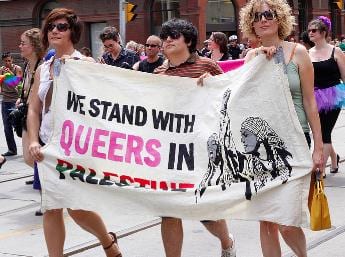Can a fresh complaint be filed about Queers Against Israeli Apartheid’s (QuAIA) participation in the Pride parade every year, or is the matter settled? That was the question before a panel of three arbitrators May 15, convened by Pride Toronto (PT) to hear two new complaints about QuAIA marching in the annual festival.
About a dozen people filed into a Yorkville boardroom to argue before three lawyers sitting as arbitrators: Martha McCarthy, Liz McIntyre and Susan Ursel. Although the complaint was brought against PT, not QuAIA, two members of QuAIA and two lawyers representing them were also present.
The hearing was sparked by Paul Berner, who filed a complaint with PT in July 2012 alleging that QuAIA falls outside the mission statement of PT. Because of that, he argues that QuAIA should not be allowed to march in the parade. The panel briefly convened a second hearing, concerning a complaint raised by Joe Clark, but because Clark declined to attend the hearing, it did not proceed.
The hearings continue a saga which began in 2010, when PT banned QuAIA from marching in the Pride parade. PT later reversed its decision.
Following community consultations, PT created a dispute resolution process through which members of the public can complain about participants in the parade.
However, the complaints could be derailed before they are argued on their merits. That’s because a dispute resolution process panel found, a year ago, that QuAIA’s participation does not violate PT’s mission statement or the City of Toronto’s anti-discrimination laws.
“One of our concerns is that this is really the same issue that was decided a year ago,” McCarthy, the panel chair, told Berner. She first raised the issue with him in an email in November and asked him to explain why his complaint is different. Berner pointed out that the previous complaint named QuAIA, whereas his complaint targets PT’s role in allowing QuAIA to march.
While arbitrators are not strictly bound by previous decisions, allowing people to continually re-litigate an issue would amount to an abuse of process, according to Shelina Ali, a lawyer for QuAIA.
A second, related issue is whether the panel is empowered to hear Berner’s complaint against PT at all. The dispute panel allows people to complain about groups that march, not about PT itself, Sean Hillier, co-chair of PT’s board of directors, told the hearing. Berner’s complaint targets PT’s actions, not QuAIA’s.
“It stands outside the jurisdiction of the panel,” Hillier said. “This process is solely intended to launch complaints against participant groups.”
The panel will answer these questions in the next few weeks. If it finds in Berner’s favour, it would then likely schedule a second hearing to discuss the substance of the complaint. The panel did not say what it will do about Clark’s complaint, given that Clark has said he does not intend to make representations in person.
Pride is for Toronto’s gay community, not for protesting “the internal policies of a foreign country,” Berner, who is not gay, told Xtra after the hearing.
“The Pride parade is not the forum for that. If they want to find one, find one. Rent a hall.”
Otherwise, Berner said that nudity in the parade is “iffy” and that he’s not a fan of the crowds, but that he’s been to the parade before and thinks it’s “good fun.”
The 2013 Pride parade is scheduled for June 30. Registration is now open for groups that would like to march.


 Why you can trust Xtra
Why you can trust Xtra


